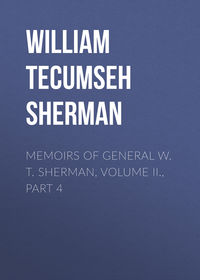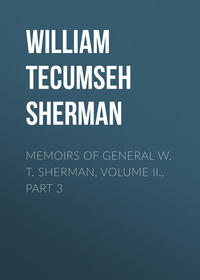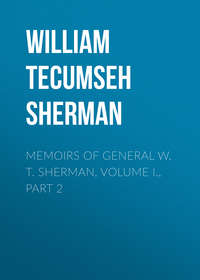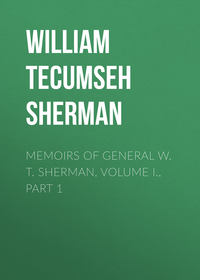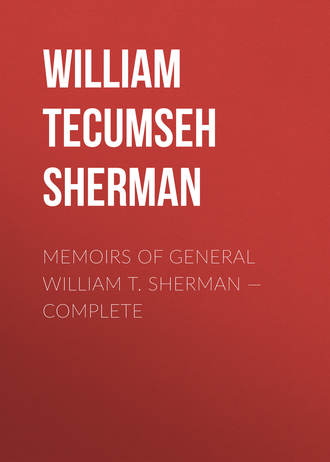 полная версия
полная версияMemoirs of General William T. Sherman — Complete
Our financial condition on that day (February 22, 1855) was: Due depositors and demand certificates, five hundred and twenty thousand dollars; to meet which, we had in the vault: coin, three hundred and eighty thousand dollars; bullion, seventy-five thousand dollars; and bills receivable, about six hundred thousand dollars. Of these, at least one hundred thousand dollars were on demand, with stock collaterals. Therefore, for the extent of our business, we were stronger than the Bank of England, or any bank in New York City.
Before daylight next morning, our door-bell was rung, and I was called down-stairs by E. Casserly, Esq. (an eminent lawyer of the day, since United States Senator), who informed me he had just come up from the office of Adams & Co., to tell me that their affairs were in such condition that they would not open that morning at all; and that this, added to the suspension of Page, Bacon & Co., announced the day before, would surely cause a general run on all the banks. I informed him that I expected as much, and was prepared for it.
In going down to the bank that morning, I found Montgomery Street full; but, punctually to the minute, the bank opened, and in rushed the crowd. As usual, the most noisy and clamorous were men and women who held small certificates; still, others with larger accounts were in the crowd, pushing forward for their balances. All were promptly met and paid. Several gentlemen of my personal acquaintance merely asked my word of honor that their money was safe, and went away; others, who had large balances, and no immediate use for coin, gladly accepted gold-bars, whereby we paid out the seventy-five thousand dollars of bullion, relieving the coin to that amount.
Meantime, rumors from the street came pouring in that Wright & Co. had failed; then Wells, Fargo & Co.; then Palmer, Cook & Co., and indeed all, or nearly all, the banks of the city; and I was told that parties on the street were betting high, first, that we would close our doors at eleven o'clock; then twelve, and so on; but we did not, till the usual hour that night. We had paid every demand, and still had a respectable amount left.
This run on the bank (the only one I ever experienced) presented all the features, serious and comical, usual to such occasions. At our counter happened that identical case, narrated of others, of the Frenchman, who was nearly squeezed to death in getting to the counter, and, when he received his money, did not know what to do with it. "If you got the money, I no want him; but if you no got him, I want it like the devil!"
Toward the close of the day, some of our customers deposited, rather ostentatiously, small amounts, not aggregating more than eight or ten thousand dollars. Book-keepers and tellers were kept at work to write up the books; and these showed:
Due depositors and certificates, about one hundred and twenty thousand dollars, for which remained of coin about fifty thousand dollars. I resolved not to sleep until I had collected from those owing the bank a part of their debts; for I was angry with them that they had stood back and allowed the panic to fall on the banks alone. Among these were Captain Folsom, who owed us twenty-five thousand dollars, secured by a mortgage on the American Theatre and Tehama Hotel; James Smiley, contractor for building the Custom-House, who owed us two notes of twenty thousand and sixteen thousand dollars, for which we held, as collateral, two acceptances of the collector of the port, Major R. P. Hammond, for twenty thousand dollars each; besides other private parties that I need not name. The acceptances given to Smiley were for work done on the Custom-House, but could not be paid until the work was actually laid in the walls, and certified by Major Tower, United States Engineers; but Smiley had an immense amount of granite, brick, iron, etc., on the ground, in advance of construction, and these acceptances were given him expressly that he might raise money thereon for the payment of such materials.
Therefore, as soon as I got my dinner, I took my saddle-horse, and rode to Captain Folsom's house, where I found him in great pain and distress, mental and physical. He was sitting in a chair, and bathing his head with a sponge. I explained to him the object of my visit, and he said he had expected it, and had already sent his agent, Van Winkle, down-town, with instructions to raise what money he could at any cost; but he did not succeed in raising a cent. So great was the shock to public confidence, that men slept on their money, and would not loan it for ten per cent. a week, on any security whatever—even on mint certificates, which were as good as gold, and only required about ten days to be paid in coin by the United States Mint. I then rode up to Hammond's house, on Rincon Hill, and found him there. I explained to him exactly Smiley's affairs, and only asked him to pay one of his acceptances. He inquired, "Why not both?" I answered that was so much the better; it would put me under still greater obligations. He then agreed to meet me at our bank at 10 P.M. I sent word to others that I demanded them to pay what they could on their paper, and then returned to the bank, to meet Hammond. In due time, he came down with Palmer (of Palmer, Cook & Co.), and there he met Smiley, who was, of course, very anxious to retire his notes. We there discussed the matter fully, when Hammond said, "Sherman, give me up my two acceptances, and I will substitute therefor my check of forty thousand dollars," with "the distinct understanding that, if the money is not needed by you, it shall be returned to me, and the transaction then to remain statu quo." To this there was a general assent. Nisbet handed him his two acceptances, and he handed me his check, signed as collector of the port, on Major J. R. Snyder, United States Treasurer, for forty thousand dollars. I afterward rode out, that night, to Major Snyder's house on North Beach, saw him, and he agreed to meet me at 8 a.m. next day, at the United States Mint, and to pay the check, so that I could have the money before the bank opened. The next morning, as agreed on, we met, and he paid me the check in two sealed bags of gold-coin, each marked twenty thousand dollars, which I had carried to the bank, but never opened them, or even broke the seals.
That morning our bank opened as usual, but there was no appearance of a continuation of the "run;" on the contrary, money began to come back on deposit, so that by night we had a considerable increase, and this went on from day to day, till nearly the old condition of things returned. After about three days, finding I had no use for the money obtained on Hammond's check, I took the identical two bags back to the cashier of the Custom-House, and recovered the two acceptances which had been surrendered as described; and Smiley's two notes were afterward paid in their due course, out of the cash received on those identical acceptances. But, years afterward, on settling with Hammond for the Custom-House contract when completed, there was a difference, and Smiley sued Lucas, Turner & Co. for money had and received for his benefit, being the identical forty thousand dollars herein explained, but he lost his case. Hammond, too, was afterward removed from office, and indicted in part for this transaction. He was tried before the United States Circuit Court, Judge McAlister presiding, for a violation of the sub-Treasury Act, but was acquitted. Our bank, having thus passed so well through the crisis, took at once a first rank; but these bank failures had caused so many mercantile losses, and had led to such an utter downfall in the value of real estate, that everybody lost more or less money by bad debts, by depreciation of stocks and collaterals, that became unsalable, if not worthless.
About this time (viz., February, 1855) I had exchanged my house on Green, street, with Mr. Sloat, for the half of a fifty-vara lot on Harrison Street, between Fremont and First, on which there was a small cottage, and I had contracted for the building of a new frame-house thereon, at six thousand dollars. This house was finished on the 9th of April, and my family moved into it at once.
For some time Mrs. Sherman had been anxious to go home to Lancaster, Ohio, where we had left our daughter Minnie, with her grandparents, and we arranged that S. M. Bowman, Esq., and wife, should move into our new house and board us, viz., Lizzie, Willie with the nurse Biddy, and myself, for a fair consideration. It so happened that two of my personal friends, Messrs. Winters and Cunningham of Marysville, and a young fellow named Eagan, now a captain in the Commissary Department, were going East in the steamer of the middle of April, and that Mr.. William H. Aspinwall, of New York, and Mr. Chauncey, of Philadelphia, were also going back; and they all offered to look to the personal comfort of Mrs. Sherman on the voyage. They took passage in the steamer Golden Age (Commodore Watkins), which sailed on April 17, 1855. Their passage down the coast was very pleasant till within a day's distance of Panama, when one bright moonlit night, April 29th, the ship, running at full speed, between the Islands Quibo and Quicara, struck on a sunken reef, tore out a streak in her bottom, and at once began to fill with water. Fortunately she did not sink fast, but swung off into deep water, and Commodore Watkins happening to be on deck at the moment, walking with Mr. Aspinwall, learning that the water was rushing in with great rapidity, gave orders for a full head of steam, and turned the vessel's bow straight for the Island Quicara. The water rose rapidly in the hold, the passengers were all assembled, fearful of going down, the fires were out, and the last revolution of the wheels made, when her bow touched gently on the beach, and the vessel's stern sank in deep water. Lines were got out, and the ship held in an upright position, so that the passengers were safe, and but little incommoded. I have often heard Mrs. Sherman tell of the boy Eagan, then about fourteen years old, coming to her state-room, and telling to her not to be afraid, as he was a good swimmer; but on coming out into the cabin, partially dressed, she felt more confidence in the cool manner, bearing, and greater strength of Mr. Winters. There must have been nearly a thousand souls on board at the time, few of whom could have been saved had the steamer gone down in mid-channel, which surely would have resulted, had not Commodore Watkins been on deck, or had he been less prompt in his determination to beach his ship. A sailboat was dispatched toward Panama, which luckily met the steamer John T. Stephens, just coming out of the bay, loaded with about a thousand passengers bound for San Francisco, and she at once proceeded to the relief of the Golden Age. Her passengers were transferred in small boats to the Stephens, which vessel, with her two thousand people crowded together with hardly standing-room, returned to Panama, whence the passengers for the East proceeded to their destination without further delay. Luckily for Mrs. Sherman, Purser Goddard, an old Ohio friend of ours, was on the Stephens, and most kindly gave up his own room to her, and such lady friends as she included in her party. The Golden Age was afterward partially repaired at Quicara, pumped out, and steamed to Panama, when, after further repairs, she resumed her place in the line. I think she is still in existence, but Commodore Watkins afterward lost his life in China, by falling down a hatchway.
Mrs. Sherman returned in the latter part of November of the same year, when Mr. and Mrs. Bowman, who meantime had bought a lot next to us and erected a house thereon, removed to it, and we thus continued close neighbors and friends until we left the country for good in 1857.
During the summer of 1856, in San Francisco, occurred one of those unhappy events, too common to new countries, in which I became involved in spite of myself.
William Neely Johnson was Governor of California, and resided at Sacramento City; General John E. Wool commanded the Department of California, having succeeded General Hitchcock, and had his headquarters at Benicia; and a Mr. Van Ness was mayor of the city. Politics had become a regular and profitable business, and politicians were more than suspected of being corrupt. It was reported and currently believed that the sheriff (Scannell) had been required to pay the Democratic Central Committee a hundred thousand dollars for his nomination, which was equivalent to an election, for an office of the nominal salary of twelve thousand dollars a year for four years. In the election all sorts of dishonesty were charged and believed, especially of "ballot-box stuffing," and too generally the better classes avoided the elections and dodged jury-duty, so that the affairs of the city government necessarily passed into the hands of a low set of professional politicians. Among them was a man named James Casey, who edited a small paper, the printing office of which was in a room on the third floor of our banking office. I hardly knew him by sight, and rarely if ever saw his paper; but one day Mr. Sather, of the excellent banking firm of Drexel, Sather & Church, came to me, and called my attention to an article in Casey's paper so full of falsehood and malice, that we construed it as an effort to black-mail the banks generally. At that time we were all laboring to restore confidence, which had been so rudely shaken by the panic, and I went up-stairs, found Casey, and pointed out to him the objectionable nature of his article, told him plainly that I could not tolerate his attempt to print and circulate slanders in our building, and, if he repeated it, I would cause him and his press to be thrown out of the windows. He took the hint and moved to more friendly quarters. I mention this fact, to show my estimate of the man, who became a figure in the drama I am about to describe. James King of Wm., as before explained, was in 1853 a banker on his own account, but some time in 1854 he had closed out his business, and engaged with Adams & Co. as cashier. When this firm failed, he, in common with all the employees, was thrown out of employment, and had to look around for something else. He settled down to the publication of an evening paper, called the Bulletin, and, being a man of fine manners and address, he at once constituted himself the champion of society against the public and private characters whom he saw fit to arraign.
As might have been expected, this soon brought him into the usual newspaper war with other editors, and especially with Casey, and epithets a la "Eatanswill" were soon bandying back and forth between them. One evening of May, 1856, King published, in the Bulletin, copies of papers procured from New York, to show that Casey had once been sentenced to the State penitentiary at Sing Sing. Casey took mortal offense, and called at the Bulletin office, on the corner of Montgomery and Merchant Streets, where he found King, and violent words passed between them, resulting in Casey giving King notice that he would shoot him on sight. King remained in his office till about 5 or 6 p.m., when he started toward his home on Stockton Street, and, as he neared the corner of Washington, Casey approached him from the opposite direction, called to him, and began firing. King had on a short cloak, and in his breast-pocket a small pistol, which he did not use. One of Casey's shots struck him high up in the breast, from which he reeled, was caught by some passing friend, and carried into the express-office on the corner, where he was laid on the counter; and a surgeon sent for. Casey escaped up Washington Street, went to the City Hall, and delivered himself to the sheriff (Scannell), who conveyed him to jail and locked him in a cell. Meantime, the news spread like wildfire, and all the city was in commotion, for grog was very popular. Nisbet, who boarded with us on Harrison Street, had been delayed at the bank later than usual, so that he happened to be near at the time, and, when he came out to dinner, he brought me the news of this affair, and said that there was every appearance of a riot downtown that night. This occurred toward the evening of May 14, 1856.
It so happened that, on the urgent solicitation of Van Winkle and of Governor Johnson; I had only a few days before agreed to accept the commission of major-general of the Second Division of Militia, embracing San Francisco. I had received the commission, but had not as yet formally accepted it, or even put myself in communication with the volunteer companies of the city. Of these, at that moment of time, there was a company of artillery with four guns, commanded by a Captain Johns, formerly of the army, and two or three uniformed companies of infantry. After dinner I went down town to see what was going on; found that King had been removed to a room in the Metropolitan Block; that his life was in great peril; that Casey was safe in jail, and the sheriff had called to his assistance a posse of the city police, some citizens, and one of the militia companies. The people were gathered in groups on the streets, and the words "Vigilance Committee" were freely spoken, but I saw no signs of immediate violence. The next morning, I again went to the jail, and found all things quiet, but the militia had withdrawn. I then went to the City Hall, saw the mayor, Van Ness, and some of the city officials, agreed to do what I could to maintain order with such militia as were on hand, and then formally accepted the commission, and took the "oath."
In 1851 (when I was not in California) there had been a Vigilance Committee, and it was understood that its organization still existed. All the newspapers took ground in favor of the Vigilance Committee, except the Herald (John Nugent, editor), and nearly all the best people favored that means of redress. I could see they were organizing, hiring rendezvous, collecting arms, etc., without concealment. It was soon manifest that the companies of volunteers would go with the "committee," and that the public authorities could not rely on them for aid or defense. Still, there were a good many citizens who contended that, if the civil authorities were properly sustained by the people at large, they could and would execute the law. But the papers inflamed the public mind, and the controversy spread to the country. About the third day after the shooting of King, Governor Johnson telegraphed me that he would be down in the evening boat, and asked me to meet him on arrival for consultation. I got C. H. Garrison to go with me, and we met the Governor and his brother on the wharf, and walked up to the International Hotel on Jackson Street, above Montgomery. We discussed the state of affairs fully; and Johnson, on learning that his particular friend, William T. Coleman, was the president of the Vigilance Committee, proposed to go and see him. En route we stopped at King's room, ascertained that he was slowly sinking, and could not live long; and then near midnight we walked to the Turnverein Hall, where the committee was known to be sitting in consultation. This hall was on Bush Street, at about the intersection of Stockton. It was all lighted up within, but the door was locked. The Governor knocked at the door, and on inquiry from inside "Who's there?"—gave his name. After some delay we were admitted into a sort of vestibule, beyond which was a large hall, and we could hear the suppressed voices of a multitude. We were shown into a bar-room to the right, when the Governor asked to see Coleman. The man left us, went into the main hall, and soon returned with Coleman, who was pale and agitated. After shaking hands all round, the Governor said, "Coleman, what the devil is the matter here?" Coleman said, "Governor, it is time this shooting on our streets should stop." The Governor replied, "I agree with you perfectly, and have come down, from Sacramento to assist." Coleman rejoined that "the people were tired of it, and had no faith in the officers of the law." A general conversation then followed, in which it was admitted that King would die, and that Casey must be executed; but the manner of execution was the thing to be settled, Coleman contending that the people would do it without trusting the courts or the sheriff. It so happened that at that time Judge Norton was on the bench of the court having jurisdiction, and he was universally recognized as an able and upright man, whom no one could or did mistrust; and it also happened that a grand-jury was then in session. Johnson argued that the time had passed in California for mobs and vigilance committees, and said if Coleman and associates would use their influence to support the law, he (the Governor) would undertake that, as soon as King died, the grand-jury should indict, that Judge Norton would try the murderer, and the whole proceeding should be as speedy as decency would allow. Then Coleman said "the people had no confidence in Scannell, the sheriff," who was, he said, in collusion with the rowdy element of San Francisco. Johnson then offered to be personally responsible that Casey should be safely guarded, and should be forthcoming for trial and execution at the proper time. I remember very well Johnson's assertion that he had no right to make these stipulations, and maybe no power to fulfill them; but he did it to save the city and state from the disgrace of a mob. Coleman disclaimed that the vigilance organization was a "mob," admitted that the proposition of the Governor was fair, and all he or any one should ask; and added, if we would wait awhile, he would submit it to the council, and bring back an answer.
We waited nearly an hour, and could hear the hum of voices in the hall, but no words, when Coleman came back, accompanied by a committee, of which I think the two brothers Arrington, Thomas Smiley the auctioneer, Seymour, Truett, and others, were members. The whole conversation was gone over again, and the Governor's proposition was positively agreed to, with this further condition, that the Vigilance Committee should send into the jail a small force of their own men, to make certain that Casey should not be carried off or allowed to escape.
The Governor, his brother William, Garrison, and I, then went up to the jail, where we found the sheriff and his posse comitatus of police and citizens. These were styled the "Law-and-Order party," and some of them took offense that the Governor should have held communication with the "damned rebels," and several of them left the jail; but the sheriff seemed to agree with the Governor that what he had done was right and best; and, while we were there, some eight or ten armed men arrived from the Vigilance Committee, and were received by the sheriff (Scannell) as a part of his regular posse.
The Governor then, near daylight, went to his hotel, and I to my house for a short sleep. Next day I was at the bank, as usual, when, about noon the Governor called, and asked me to walk with him down-street He said he had just received a message from the Vigilance Committee to the effect that they were not bound by Coleman's promise not to do any thing till the regular trial by jury should be had, etc. He was with reason furious, and asked me to go with him to Truett's store, over which the Executive Committee was said to be in session. We were admitted to a front-room up-stairs, and heard voices in the back-room. The Governor inquired for Coleman, but he was not forthcoming. Another of the committee, Seymour, met us, denied in toto the promise of the night before, and the Governor openly accused him of treachery and falsehood.
The quarrel became public, and the newspapers took it up, both parties turning on the Governor; one, the Vigilantes, denying the promise made by Coleman, their president; and the other, the "Law-and-Order party," refusing any farther assistance, because Johnson had stooped to make terms with rebels. At all events, he was powerless, and had to let matters drift to a conclusion.
King died about Friday, May 20th, and the funeral was appointed for the next Sunday. Early on that day the Governor sent for me at my house. I found him on the roof of the International, from which we looked down on the whole city, and more especially the face of Telegraph Hill, which was already covered with a crowd of people, while others were moving toward the jail on Broadway. Parties of armed men, in good order, were marching by platoons in the same direction; and formed in line along Broadway, facing the jail-door. Soon a small party was seen to advance to this door, and knock; a parley ensued, the doors were opened, and Casey was led out. In a few minutes another prisoner was brought out, who, proved to be Cora, a man who had once been tried for killing Richardson, the United States Marshal, when the jury disagreed, and he was awaiting a new trial. These prisoners were placed in carriages, and escorted by the armed force down to the rooms of the Vigilance Committee, through the principal streets of the city. The day was exceedingly beautiful, and the whole proceeding was orderly in the extreme. I was under the impression that Casey and Cora were hanged that same Sunday, but was probably in error; but in a very few days they were hanged by the neck—dead—suspended from beams projecting from the windows of the committee's rooms, without other trial than could be given in secret, and by night.


